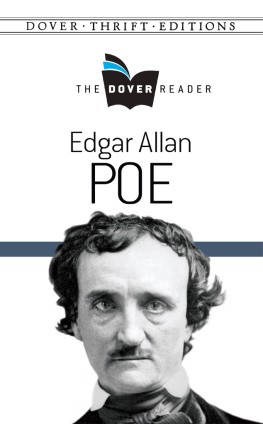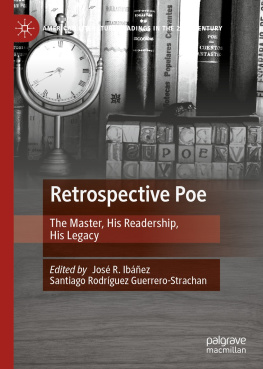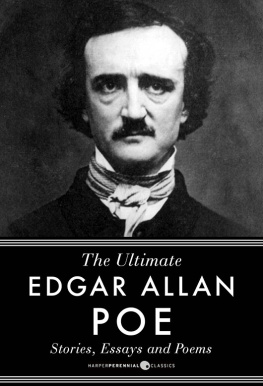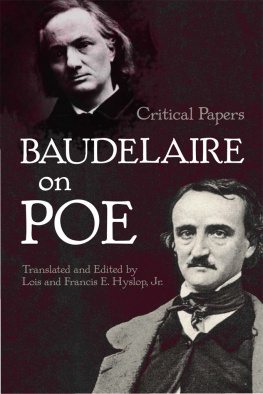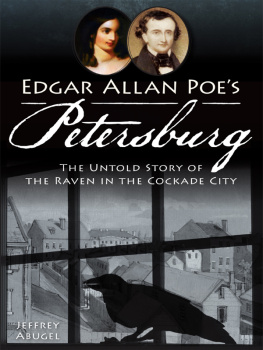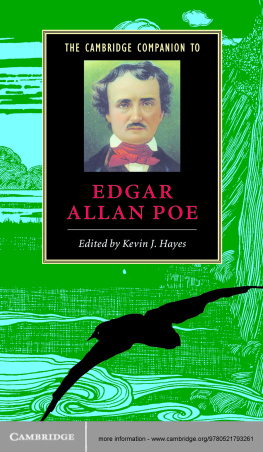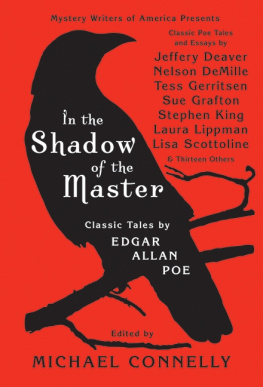About the Contributors
Amy C. Branam is an assistant professor of English at Frostburg State University. Her research areas include transatlantic nineteenth-century literature and womens studies. She has published in the Edgar Allan Poe Review, ANQ, JFA, and various edited collections.
Dennis W. Eddings, a longtime scholar of Poe and Mark Twain, as well as numerous other American authors, is retired from the faculty of Western Oregon University. He is the editor of The Naiad Voice: Essays on Poes Satiric Hoaxing and past president of the Poe Studies Association.
Benjamin F. Fisher IV received his M.A. and Ph. D. degrees from the English Department at Duke University in 1963 and 1969, respectively. He has published numerous books on Poe including The Very Spirit of Cordiality: The Literary Uses of Alcohol and Alcoholism in the Tales of Edgar Allan Poe; Poe and Our Times: Influences and Affinities; Poe and His Times: The Artist in His Milieu; and The Cambridge Introduction to Edgar Allan Poe. In 1993, Fisher was awarded a Governors Citation from the State of Maryland for his contributions to Poe studies. He has also published on such authors as Mary Wilkins Freeman, Frederick Irving Anderson, Edith Wharton, Stephen Crane, and Frank Norris and been active in the leadership of numerous literary societies and professional organizations, including the Poe Studies Association, which awarded him honorary membership for his service.
Peter Goodwin is a lecturer in English at the University of California, Berkeley, and San Francisco State University. He is currently working on a book about the gentleman, the dandy, and the cosmopolitan in nineteenth-century American literature.
Kevin J. Hayes, professor of English at the University of Central Oklahoma, is the author or editor of several books including Poe and the Printed Word (2000), The Cambridge Companion to Poe (2002), and Edgar Allan Poe (2009).
James M. Hutchisson, editor of this volume, is professor and director of graduate studies in English at The Citadel in Charleston, South Carolina. He has published widely on nineteenth- and twentieth-century American authors. His most recent book is POE, an acclaimed biography (2005), which earned starred reviews from major newspapers, magazines, and academic journals.
Leon Jackson is associate professor of English at the University of South Carolina. He is the author of The Business of Letters: Authorial Economies in Antebellum America (2008), as well as many essays on nineteenth-century American literature and the History of the Book. His current book project is a history of blackmail from the sixteenth century to the present.
John F. Jebb teaches writing and American literature at the University of Delaware. He co-authored, with J. K. Van Dover, Isnt Justice Always Unfair? The Detective in Southern Literature (1997). He also graduated from the New Castle County (Delaware) Citizens Police Academy.
Daniel J. Philippon is associate professor of English at the University of Minnesota, Twin Cities, where he teaches courses in environmental literature, history, and ethics. He is the author of Conserving Words: How American Nature Writers Shaped the Environmental Movement (2004), the editor of Our Neck of the Woods: Exploring Minnesotas Wild Places (2009), and the co-editor of Coming into Contact: Explorations in Ecocritical Theory and Practice (2006), among other books. He is also past president of the Association for the Study of Literature and Environment (ASLE).
Laura Saltz is associate professor of art and American studies at Colby College, where she teaches courses on American visual culture. She has published on visual culture and the work of Henry James, Edith Wharton, Margaret Fuller, and Poe. She is working on a book about romantic and transcendental conceptions of photography and its relationship to the science of light in the early nineteenth century.
C. T. Walters has published in The Edgar Allan Poe Review, The Automotive History Review, The Winterthur Portfolio, The Journal of American Culture, and The University of Michigan Museum Handbook. He has contributed chapters to Rituals and Ceremonies in Popular Culture (1980) and Pseudo-Science in Nineteenth-Century America (1987).
Justin R. Wert is an assistant professor of English at Piedmont Virginia Community College in Charlottesville, Virginia. In 2009, he delivered the Edgar Allan Poe Annual Lecture in Baltimore, which will be published in 2010 as A Tale of the Ragged Mountains: Of Mesmerism and Composition, a monograph by the Edgar Allan Poe Society/University of Baltimore. He is the editor of a forthcoming Gothic edition of William Gilmore Simmss novel Richard Hurdis to be published by Udolpho Press in 2010. Wert is also the author of articles on Stephen Crane, Robert Montgomery Bird, and William Faulkner. At present, Professor Wert, who founded the Charlottesville-based Piedmont Writers Group in 2008, is at work revising his own novels, The Night Road and Both Sides Now, for future publication.
Acknowledgments
Chapter 6 originally appeared in a slightly different form in Southern Literary Journal, and chapters 1 and 9 in The Edgar Allan Poe Review. Permission to reprint these essays has been kindly granted by the editors of those journals and by their authors.
The contributors to this volume deserve special recognition. Not only has their work made for engaging and stimulating reading, but their patience has probably stretched the bounds of credulity through what became an unusually long period of composition and production. I am sure they are glad to see their superb essays finally in print.
I am grateful to Winifred Bo Moore, Dean of the School of Humanities and Social Sciences at The Citadel, for funding for research assistance. A sabbatical leave, underwritten by The Citadel Foundation, also provided time to work on this book.
To these friends and colleagues in particular I owe thanks for help, ideas, and, when needed, an attentive ear: Scott Peeples, Ben Fisher, Wally Coberg, John Jebb, Peter Norberg, Rich Fusco, Barbara Cantalupo, Susan Donaldson, Kevin Hayes, Matthew Pearl, Richard Rust, and James L. W. West III. All Poe scholars are deeply saddened by the passing of Burton R. Pollin, Jr., but his vast and important writing on Poe will continue to aid the work of generations to come.
As always, thanks go to my wife, Rachel. She reminds me that peace and quiet are nice, but a little healthy chaos is a good thing too.
J. H.
January 2011
ONE
Poes Philosophy of Furniture and the Aesthetics of Fictional Design
C. T. Walters
Glowing color, the illusion of great space, and splendors all the richer that they owe nothing to materials and everything to art, these are the hallmarks of an apartment that, appropriately, belongs to a painter. House and Garden, November 1983
Preceded and followed in Burtons Gentlemens Magazine for May 1840 by the poems, The Betrayed and The Pilgrim to His Staff, Poes short article The Philosophy of Furniture exerted and continues to exert an influence far beyond its modest scale. In 1864, little more than fifteen years after Poes death, the article was reissued in an English periodical, Cornhill Magazine, under the title The Fashion of Furniture. Immediately thereafter, Clarence Cook (18281900), one of the most influential writers of Victorian life and decorum, annotated Poes essay in the New Path Magazine of 1865, a periodical inspired by John Ruskin. Brief, yet expansive in meaning, Poes


